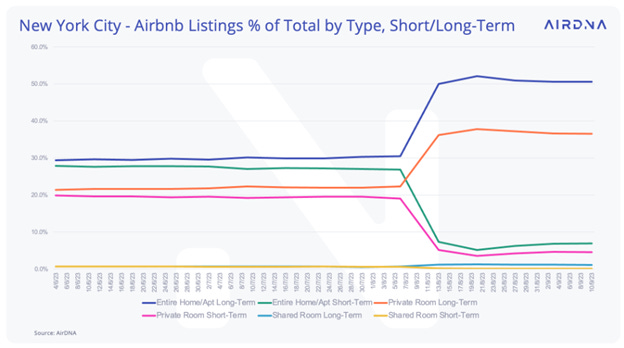Four reasons why NYC hotels are a good bet
National & local changes that will make 2024 a strong year for NYC hotel investors
Fitch Ratings believes that the growth in demand for U.S. hotel stays that occurred in response to COVID-19 lockdowns will start to slow in 2023 and into 2024, and here’s why that could be a good thing.
Business travel will increase, and occupancy rates will grow
Analysts at Fitch believe that more business travel will yield higher occupancy rates and that that will come at the cost of having lower nightly rates (not good). They see the growth in revenue per available room (RevPAR) tapering from 5-6% this year to below 2% next year. The researchers make clear that luxury hotels will not follow this trend of lower RevPAR growth. Hotels that are for want of business travelers who stay for longer and use corporate discount codes are suited for that client profile. They do not overlap with the trendy leisure hotels that rely on higher RevPAR from guests who have luxury budgets.
The industry will continue to be supply constrained
Fitch estimates there will be less than 2% growth in the hotel stock in the U.S. in the next two years, maybe longer (not to be confused with hotel stocks, which are outperforming the S&P 500 with 24.3% gains year to date).
“Challenging borrowing conditions, depressed hotels values in key, large urban markets,” and probably greatly reduced construction levels during the pandemic, all contributed to the slowdown.
Thanks to some trends that Fitch points out and some local happenings, NYC hotel owners and prospective buyers are poised for success over the next few years as well. The main things to look at are as follows:
NYC is hotel supply constrained
Out of ~133,000 existing hotel rooms, NYC lost 7,500 as a result of the pandemic. That means some hotels have shut their doors and have not reopened.
A special permit is required to build more hotels in the city. In 2018, city officials noticed an uptick in hotels being built in manufactured zoned areas (M-1) and they passed an amendment to the zoning text requiring special permission to build in M-1 communities. In 2021, the city doubled down and passed a zoning resolution to require permitting for all hotel ground up construction or significant FAR addition, anywhere within the five boroughs. As of September 2023 – 21 months after the passing of the bill, no new hotel plans have been approved under the new permit. These requirements will limit the new supply of hotels and push up nightly rates.
NYC has luxury hotels that don’t follow normal price trends
Fitch Ratings’s report notably mentioned that luxury hotels would not be as affected by the slowdown in RevPAR growth. NYC has more luxury hotels than other cities in the U.S. That means growth in nightly room rates should remain comparatively higher in NYC, which is home to places like The Aman hotel (opened in summer of 2022 and boasted the highest nightly room rate in NYC at $3,200 per night as of August 2022).
Migrant Crisis
NYC’s hotel occupancy rate jumped from 42.7% earlier this year to 66.2%, according to STR a data provider. A little less than half of this increase was due to contract occupancy where 10+ rooms are booked for periods >30 days. Given the influx of migrants, and the reduced level of demand from other industries that would use contract occupancy pre pandemic (like airline staff) it is believed that these long-term reservations are for the migrants. This demand for rooms has acted as a life raft for hotels in dire financial straits, like the Holiday Inn at 99 Washington Street.
Anti Airbnb laws have reduced the # of hotel room substitutes
Local Law 18, which was previously called a de facto ban on Airbnb, went into effect September 5th of this year. The law prevents short-term rental platforms from processing transactions from hosts who are not registered with NYC. Further, only those hosts who live in the place they are renting can host. One month into the change, it appears that total Airbnb listings are down about 12%, according to AirDNA, which tracks Airbnb data. The bulk of the short-term listing inventory is gone (90% reduction), but many of those units are now being re-listed as longer term (30 + day stays).
Thanks to all these data points, some hoteliers are expecting to see +10% increases to their 2019 revenue figures on their NYC properties in the upcoming year. With that said, no analysis would be complete without the inclusion of some relevant risks. Some important challenges that continue to pose a threat to the industry are listed below:
Rising labor costs from union and non-union wages (see the Hotel Trades Council)
Growing insurance costs (see the NYC storm on 9/29)
Energy costs due to rising fuel expenses and green retrofits (see Local Law 97)
Sources: Fitch Ratings, WSJ, CoStar, and NYC Gov



